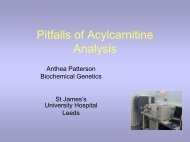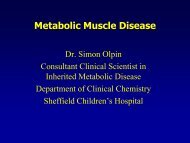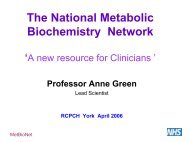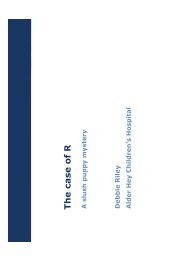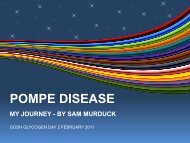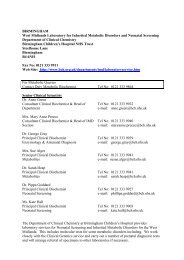THE TRANSFERABLE SKILLS FRAMEWORK - MetBio.Net
THE TRANSFERABLE SKILLS FRAMEWORK - MetBio.Net
THE TRANSFERABLE SKILLS FRAMEWORK - MetBio.Net
Create successful ePaper yourself
Turn your PDF publications into a flip-book with our unique Google optimized e-Paper software.
<strong>THE</strong> <strong>TRANSFERABLE</strong><br />
<strong>SKILLS</strong> <strong>FRAMEWORK</strong><br />
Chrystalla Ferrier<br />
St. Mary’s s Hospital<br />
Imperial College Healthcare NHS Trust
DOES <strong>THE</strong> POSSESSION OF<br />
<strong>TRANSFERABLE</strong> <strong>SKILLS</strong> MAKE A<br />
BETTER BIOMEDICAL SCIENTIST?
<strong>TRANSFERABLE</strong><br />
<strong>SKILLS</strong><br />
KEY <strong>SKILLS</strong>
14+ KEY <strong>SKILLS</strong> QUALIFICATIONS<br />
Main Key Skills<br />
Communication<br />
Application of Number<br />
Information and Communication Technology<br />
Wider Key Skills<br />
Working with others<br />
Improving own learning and performance<br />
Problem solving
HEALTH CARE PROGRAMME QUALIFICATIONS<br />
DEGREE QUALITY ASSURANCE AGENCY FOR<br />
HIGHER EDUCATION (QAA) BENCHMARKS<br />
Degree Course<br />
Audiology ,Arts Therapy,<br />
Clinical Psychology,<br />
Clinical sciences, Dental<br />
Care Professions,<br />
Dietetics, Health visiting,<br />
Midwifery, Nursing,<br />
Occupational Therapy,<br />
Operating Department<br />
Practice, Orthoptics,<br />
Paramedic Science,<br />
Physiotherapy, Podiatry<br />
Prosthetics and Orthotics,<br />
Radiography, Speech and<br />
Language Therapy<br />
Skills common to all<br />
Information gathering<br />
Problem solving<br />
Communication<br />
Numeracy<br />
Information Technology
COMMON TO ALL NHS AGENDA<br />
FOR CHANGE EMPLOYEES
KNOWLEDGE AND <strong>SKILLS</strong><br />
<strong>FRAMEWORK</strong><br />
Defining the expectations of each post within a<br />
number of predefined Core and Specific<br />
Dimensions<br />
Level of complexity and specification of areas of<br />
application<br />
Achievement/evidence of knowledge and skills<br />
eventually on e-KSF and therefore electronic<br />
staff records<br />
Links with Learning Management Systems
KNOWLEDGE AND <strong>SKILLS</strong><br />
<strong>FRAMEWORK</strong><br />
Record transferable to any NHS employer<br />
Linked to Annual Performance Review<br />
?Flexibility for the creation of new roles<br />
?Flexibility for transfer to different NHS roles
KNOWLEDGE AND <strong>SKILLS</strong><br />
<strong>FRAMEWORK</strong><br />
Core Dimensions<br />
1 Communication<br />
2 Personal and people development<br />
3 Health, safety and security<br />
4 Service improvement<br />
5 Quality<br />
6 Equality and diversity
KNOWLEDGE AND <strong>SKILLS</strong><br />
<strong>FRAMEWORK</strong><br />
24 Specific Dimensions many of which will apply to<br />
a wide range of professions e.g.<br />
Information and Knowledge - IK1, IK2 and IK3<br />
Learning and Development - G1<br />
People Management - G6<br />
Products to meet health and wellbeing needs -<br />
HWB10
FOR BIOMEDICAL SCIENTISTS
Mapping Teaching/Training to KSF<br />
and Portfolio Standards<br />
KSF and Version 3 IBMS CoC Portfolio Mapping for 2008 Tutorials<br />
TUTORIAL<br />
The IBMS Certificate of Competence<br />
Registration Portfolio<br />
The HPC and IBMS<br />
Storage and Archiving of Pathology Records<br />
and Specimens/The Human Tissue Act<br />
Clinical Pathology Accreditation<br />
Data Protection and Caldicott<br />
Equal Opportunities<br />
Departmental Structures<br />
Limits of Practice and Referral<br />
Workload Management/European Working<br />
Time Directive<br />
Waste Disposal<br />
Health and Safety 1<br />
Health and Safety 2<br />
Continuing Professional Development/KSF<br />
Customer Service on the Telephone<br />
Laboratory Links<br />
Pathology IT Systems<br />
KSF Dimension<br />
Core 2<br />
Core 1 - 6<br />
Core 2, 3<br />
Core 2, 5<br />
Core 1 – 3, 5, 6,<br />
IK1, 2<br />
Core 2, 6<br />
Core 2<br />
Core 1, 2<br />
Core 2, 3, 5<br />
Core 2, 3<br />
Core 2, 3<br />
Core 2, 3<br />
Core 2<br />
Core 1, 2, 6<br />
Core 1, 2<br />
Core 1, 2, IK1, 2<br />
Registration Portfolio<br />
Standards<br />
1a.1a, 1a.5a<br />
1a.1b, 1a.4a – c<br />
1a.1c<br />
1a.1b, 1a.3a – b, 1b.3f<br />
1a.2 a – b<br />
1a.6d<br />
1a.6a – f<br />
1a.7a – d, 2b.3a<br />
1a.1b, 1a.1d, 3a.3g<br />
1a.8a – d, 3a.3a – i<br />
1a.8a – d, 3a.3a – i<br />
1a.8d, 2b.1g<br />
1b.3a – f, 1b.4a<br />
1b.1a – c, 1b.2a – c<br />
2b.2c, 2b.5a - g<br />
Assignment Details<br />
MCQ<br />
Quiz<br />
Quiz and short<br />
assignment<br />
Quiz<br />
Quiz<br />
Quiz<br />
Quiz<br />
Quiz<br />
Quiz<br />
Quiz<br />
Quiz<br />
Quiz<br />
MCQ<br />
Quiz<br />
Quiz
HPC CPD REQUIREMENTS<br />
First audit of Biomedical Scientists November<br />
2009<br />
Record of continuous CPD activity<br />
Mixture of activities that aim to improve<br />
the quality of the service and benefit the<br />
service user<br />
Link to KSF Evidence
ONE PROFESSIONAL PORTFOLIO
IBMS ACCREDITED<br />
BSC BIOMEDICAL SCIENCE<br />
QAA benchmark statement for BSc Biomedical<br />
Science<br />
Key transferable skills including :<br />
communication<br />
information technology<br />
numeracy (including the preparation, processing,<br />
interpretation and presentation of data)<br />
data analysis<br />
negotiating skills
IBMS ACCREDITED<br />
BSC BIOMEDICAL SCIENCE<br />
Discipline and subject-specific skills associated<br />
with laboratory practice including :<br />
safe handling of specimens<br />
sample preparations<br />
aseptic techniques,<br />
liquid handling<br />
use of relevant instrumentation taking into<br />
account such factors as accuracy, calibration,<br />
precision and replicability, accurate<br />
interpretation of patient data and problem<br />
solving
IBMS ACCREDITED<br />
BSC BIOMEDICAL SCIENCE<br />
Research skills including:<br />
ethics<br />
governance<br />
audit<br />
experimental design<br />
statistical analysis<br />
literature searching<br />
critical appraisal of literature<br />
scientific communication
IBMS CERTIFICATE OF COMPETENCE<br />
REGISTRATION PORTFOLIO<br />
Generic<br />
Interpretation of HPC Standards of Proficiency<br />
for Biomedical Scientists<br />
Evidence from single or multiple pathology<br />
disciplines<br />
Mapping of degree modules and expected<br />
workplace outcomes for HPC approved degrees<br />
and IBMS accredited co terminus/integrated<br />
degrees<br />
A new generation of biomedical scientists with<br />
broad underpinning knowledge
IBMS SPECIALIST DIPLOMAS<br />
Reinforcement of generic knowledge and skills in<br />
section 6:<br />
6.1 Professional Roles and Relationships<br />
6.2 Health and Safety<br />
6.3 Receipt and Processing of Samples<br />
6.4 Laboratory Computer System<br />
6.5 Laboratory Equipment<br />
6.6 Quality Assurance
PATHOLOGY LABORATORIES<br />
TODAY – What has changed?<br />
Workload<br />
Regulation<br />
More Automation<br />
More Cross- Discipline Platform Technology<br />
More Information Technology<br />
More External Audit<br />
More Staff Training and Development
Technology<br />
Increased automation (Levels 1 to 4)<br />
Cross discipline skills automation skills<br />
Cross discipline platform technology –<br />
immunoassay, PCR<br />
Expertise and transferable skills in immunoassay<br />
and PCR<br />
Does technology based expertise impact on ability<br />
to interpret patient results?
Laboratory Accreditation<br />
Clinical Pathology Accreditation (CPA)<br />
Medicines and Healthcare Products Regulatory<br />
Agency (MHRA)<br />
Good Laboratory Practice/Good Clinical<br />
Practice/Good Manufacturing Practice<br />
(GLP/GCP/GMP)<br />
Health and Safety Executive (HSE)<br />
European Federation of Immunological Societies<br />
(EFIS)
Training<br />
CPA Training Standards/periodic competency<br />
assessment post initial training<br />
IBMS Training Status Approval for laboratories<br />
Evidence-based requirement for pre and post<br />
registration IBMS qualifications<br />
Authentication of evidence<br />
Ideal input from lots of staff members
Information Technology<br />
Increased requirements to match increased<br />
automation<br />
Electronic communication with more users<br />
NHS Connecting for Health, Care Records<br />
Service<br />
Electronic Staff Records
Post Registration Qualifications for<br />
Biomedical Scientist Staff<br />
MSc courses<br />
Discipline specific<br />
Generic aspects<br />
Combination of both<br />
Requirements for transferable knowledge and<br />
skills<br />
At expense of discipline specific scientific and<br />
clinical knowledge<br />
Choice of modules<br />
How much choice?
Over to you?
REFERENCES<br />
<br />
<br />
<br />
<br />
<br />
<br />
<br />
<br />
www.direct.gov.uk/en/EducationAndLearning/QualificationsExplained/<br />
DG_10039028<br />
www.keyskills4u.com/tests<br />
www.qaa.ac.uk/academicinfrastructure/benchmark/statements/Biomed<br />
icalscience07.asp<br />
www.dh.gov.uk/en/Publicationsandstatistics/Publications/Publications<br />
PolicyAndGuidance/DH_4090843<br />
www.mhra.gov.uk<br />
www.cpa-uk.co.uk<br />
www.connectingforhealth.nhs.uk<br />
Automated Immunoassay Analysers. Wheeler, M. Annals of Clinical<br />
Biochemistry; May 2001;38;page 217


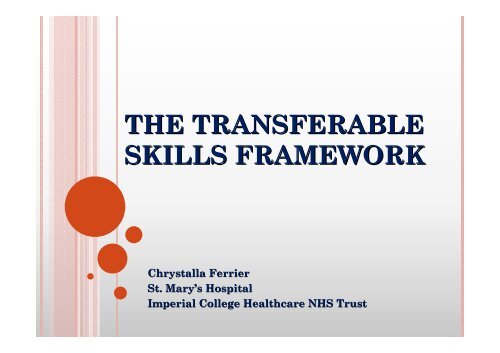
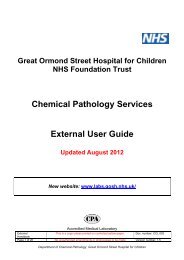
![GSD 14.10.10.ppt [Compatibility Mode] - MetBio.Net](https://img.yumpu.com/49674680/1/190x135/gsd-141010ppt-compatibility-mode-metbionet.jpg?quality=85)
